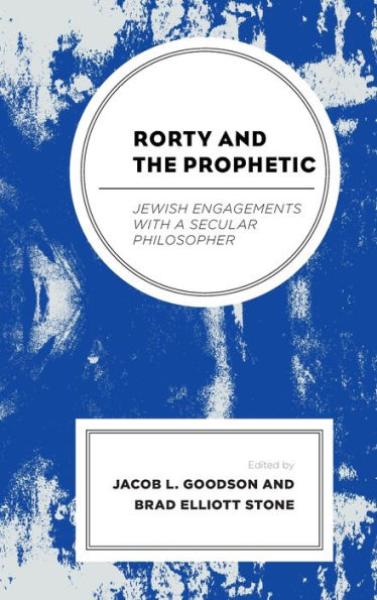Description
Rorty and the Prophetic interrogates and provides a constructive assessment to the American neo-pragmatist philosopher Richard Rorty's critiques of Jewish ethics. Rorty dismisses the public applicability of Jewish moral reasoning, because it is based on "the will of God" through divine revelation. As a self-described secular philosopher, it comes as no surprise that Rorty does not find public applicability within a divinely-ordered Jewish ethic. Rorty also rejects the French Jewish philosopher Emmanuel Levinas's ethics, which is based upon the notion of infinite responsibility to the Face of the Other. In Rorty's judgment, Levinas's ethics is "gawky, awkward, and unenlightening." From a Rortyan perspective, it seems that Jewish ethics simply can't win: either it is either too dependent on the will of God or over-emphasizes the human Other. The volume responds to Rorty's criticisms of Jewish ethics in three different ways: first, demonstrating agreements between Rorty and Jewish thinkers; second, offering reflective responses to Rorty's critiques of Judaism on the questions of Messianism, prophecy, and the relationship between politics and theology; third, taking on Rorty's seemingly unfair judgment that Levinas's ethics is "gawky, awkward, and unenlightening." While Rorty does not engage the prophetic tradition of Jewish thought in his essay, "Glorious Hopes, Failed Prophecies," he dismisses the possibility for prophetic reasoning because of its other-worldliness and its emphasis on predicting the future. Rorty fails to attend to and recognize the complexity of prophetic reasoning, and this book presents the complexity of the prophetic within Judaism. Toward these ends and more, Brad Elliott Stone and Jacob L. Goodson offer this book to scholars who contribute to the Jewish academy, those within American Philosophy, and those who think Richard Rorty's voice ought to remain in "conversations" about religion and "conversations" among the religious.
This book brings Jewish moral reasoning into conversation with Richard Rorty's secular neo-pragmatist philosophy, which oftentimes comes across as anti-religious. The result is a type of hope for the future concerning the relationship between Judaism and secularism.
"Many books are good, a few rise to the level of 'important', but very few deserve to be called 'necessary.' This is one of those very rare and truly necessary books. We live in a time Rorty foresaw throughout his career, and his writing offers insight for the years that lie ahead. These essays connect Rorty's hopeful, forward-looking vision with the timeless and deep tradition of Jewish commentary, and with the timely and necessary possibility of prophetic voices that can speak truth to power. Especially in his later writings, Rorty offered a hopeful vision of hospitality instead of hostility, of solidarity in the face of increasing polarization and fearful solitude, and the preaching of mutual flourishing instead of the weaponization of sound bites. Goodson, Stone, and the authors they have assembled offer relevant and timely words of hope exactly when we need them."--David O'Hara, Augustana University
"Rorty in dialogue with traditions of Jewish prophecy? When lecturing in my Pragmatism and Religion class at the University of Virginia, Professor Rorty was generous with heart and mind--even while wincing at our scripture-based questions. I do not imagine Rorty's students and readers wincing at this exciting collection devised by Goodson and Stone. They would be too intrigued by the juxtapositions: Rorty, prophecy, rabbinic Judaism, and Christianity too? They will be too stimulated by the deep philosophic work that assembles the likes of Jacques Derrida, Martin Buber, C. S. Peirce, Walter Benjamin, Emmanuel Levinas, Cornel West, and more into a company of Rortyan societal reformers. They will be too moved by the civilizational urgency of this book at this moment in this time."--Peter Ochs, Edgar M. Bronfman Professor of Modern Judaic Studies at the University of Virginia
This book brings Jewish moral reasoning into conversation with Richard Rorty's secular neo-pragmatist philosophy, which oftentimes comes across as anti-religious. The result is a type of hope for the future concerning the relationship between Judaism and secularism.
"Many books are good, a few rise to the level of 'important', but very few deserve to be called 'necessary.' This is one of those very rare and truly necessary books. We live in a time Rorty foresaw throughout his career, and his writing offers insight for the years that lie ahead. These essays connect Rorty's hopeful, forward-looking vision with the timeless and deep tradition of Jewish commentary, and with the timely and necessary possibility of prophetic voices that can speak truth to power. Especially in his later writings, Rorty offered a hopeful vision of hospitality instead of hostility, of solidarity in the face of increasing polarization and fearful solitude, and the preaching of mutual flourishing instead of the weaponization of sound bites. Goodson, Stone, and the authors they have assembled offer relevant and timely words of hope exactly when we need them."--David O'Hara, Augustana University
"Rorty in dialogue with traditions of Jewish prophecy? When lecturing in my Pragmatism and Religion class at the University of Virginia, Professor Rorty was generous with heart and mind--even while wincing at our scripture-based questions. I do not imagine Rorty's students and readers wincing at this exciting collection devised by Goodson and Stone. They would be too intrigued by the juxtapositions: Rorty, prophecy, rabbinic Judaism, and Christianity too? They will be too stimulated by the deep philosophic work that assembles the likes of Jacques Derrida, Martin Buber, C. S. Peirce, Walter Benjamin, Emmanuel Levinas, Cornel West, and more into a company of Rortyan societal reformers. They will be too moved by the civilizational urgency of this book at this moment in this time."--Peter Ochs, Edgar M. Bronfman Professor of Modern Judaic Studies at the University of Virginia
Last updated on
Product Details
- Lexington Books Brand
- Feb 15, 2021 Pub Date:
- 1498523005 ISBN-10:
- 9781498523004 ISBN-13:
- 246 Pages
- 9 in * 6 in * 0.69 in Dimensions:
- 1 lb Weight:




